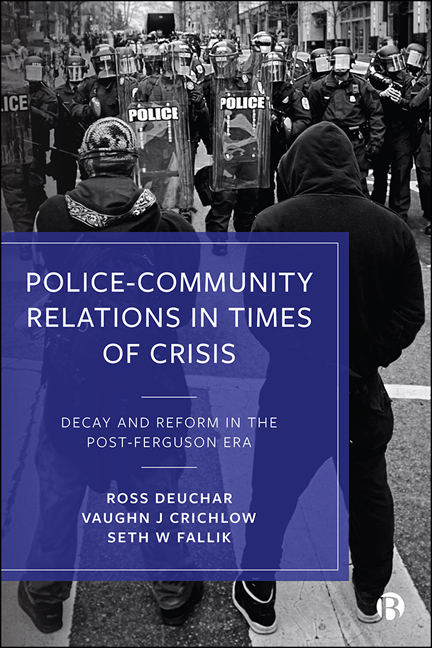6 - Police as “Guardians” and “Warriors”: Non-Law Enforcement Insights
Published online by Cambridge University Press: 21 December 2021
Summary
In this part of the book we turn our attention to practitioner and youth perspectives on policing and police–community relations in the post-Ferguson era. In this chapter we begin by placing the spotlight on the voices of non-police practitioners who worked closely with racial minority youths in one of the counties studied. Drawing on data from semi-structured interviews, we outline the insights we gained into the current challenges faced by young racial minority males in local communities and the relationship between some of these issues and gang-related violence and crime in their neighborhoods. Insights are presented into the type of community-centered interventions in place within the county to prevent violence and to re-engage disadvantaged young men (including those involving law enforcement), as well as practitioners’ reflections on their nature and impact.
The prominent role or apparent absence of police in these interventions is considered, drawing on the perspectives of practitioners, and supplementary insights from youth focus groups shed light on justice-involved young men's continued distrust of law enforcement. We draw implications from practitioners on the challenges stemming from the policing of young men located in gangaffected neighborhoods, and how this may have evolved in the post-Ferguson era. Given the prominence of street gangs in the locations where fieldwork was conducted, we begin the chapter with a brief overview of some of the existing literary insights on gangs in the literature. Specifically, we focus on the literature on gang involvement among racial minority males and their relationships with the police.
Racial minority men, gangs, violence, and the police
Since the time of the early work conducted by Frederic Thrasher (1927) and the Chicago School of Sociology, many academics have analyzed and described how poverty, unemployment, social disorganization, and oppression can help to stimulate gang culture among groups of young men (Shaw & MacKay, 1942; Whyte, 1943; Cohen, 1955; Cloward & Ohlin, 1960; Anderson, 1999; Decker et al, 2013). Some contemporary scholars (Anderson, 1999; Alonso, 2004; Hagedorn, 2008) believe that young Black men are the most prominent casualties of advanced marginality in American towns and cities, and that this may stimulate their violent offending (see Wacquant, 2008; Deuchar, 2013, 2018).
- Type
- Chapter
- Information
- Police-Community Relations in Times of CrisisDecay and Reform in the Post-Ferguson Era, pp. 103 - 128Publisher: Bristol University PressPrint publication year: 2021



